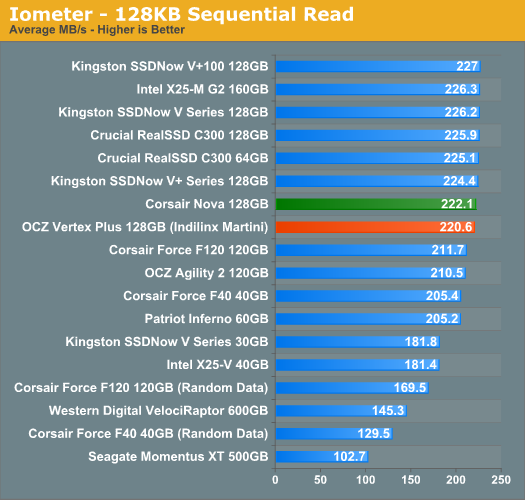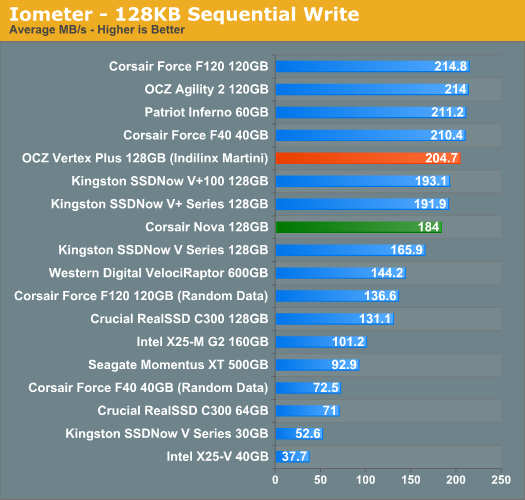OCZ Vertex Plus Preview: Introducing the Indilinx Martini
by Anand Lal Shimpi on November 16, 2010 9:31 AM EST- Posted in
- Storage
- SSDs
- OCZ
- Indilinx Martini
- Intrepid
Sequential Read/Write Speed
To measure sequential performance I ran a 3 minute long 128KB sequential test over the entire span of the drive at a queue depth of 1. The results reported are in average MB/s over the entire test length.
Sequential read performance hasn't changed compared to Barefoot, but it's still among the top 5% of performers. Sequential write speed has improved tremendously, now almost equaling the performance of the SandForce drives without any stipulations on what type of data you have to be writing to get that sort of performance.












61 Comments
View All Comments
MeanBruce - Tuesday, November 16, 2010 - link
With SandForce recently releasing their SF-2000 controller stats Intel has delayed the G3s my guess is to rework the entire M and X lineup. I love my little X25-M, but with SF claiming read/writes approaching 500mg/s Intel just has to do something to stay competative! You know SandForce is just a little company in California with 83 employees, and some 80M in cash, when they go public buy buy buy!surt - Tuesday, November 16, 2010 - link
Sorry, but they are a HUGE ipo risk. They have one, first-generation product. It happens to perform better than the first generation products of huge, well known competitors. All competitors in this product space will be maxing out the interface bandwidth within 2 years. When that happens, do you think IT purchasers are going to choose sandforce over intel controllers? When that happens, their stock will tank on down to zero, and they will be a niche player if they are not out of business.Shadowmaster625 - Tuesday, November 16, 2010 - link
They will be bought by a Fortune500 company.MeanBruce - Wednesday, November 17, 2010 - link
I get where you're coming from, but SandForce is moving into using their controllers on PCIe cards with their newest client, guess who? Seagate! Yup knocked me off my chair when I heard the news too, but I think it's fantastic, no bandwidth problems there. Their first SKUs will be for enterprise. Thanks to SandForce the next offerings from Intel should be damn nice; things are getting interesting.MeanBruce - Tuesday, November 16, 2010 - link
Indilinx, I think I'll keep my shoes on!!!jaydee - Tuesday, November 16, 2010 - link
One of my big problems with all these SSD reviews, is they are almost always 120GB+ versions, when the mainstream market is 60-90GB and we have no idea how these SSD's scale down to smaller capacities.For instance, I WAS really impressed with the Crucial C300, come to find out just now that the 64GB version isn't in the same league as the 128GB. Others seem to take smaller performance hits as you move down in capacity (Intel X25-M 160GB vs 80GB). SandForce-1200? Who knows, there's no 60GB-90GB version in the storage bench, and I never see one in any of these benchmarks. Not everyone can afford a $200-300 SSD.
melgross - Tuesday, November 16, 2010 - link
That's very true, but the market is going to larger sizes. The only reason they have those small drives is because of cost. A year ago, 64GB drives cost as much as 128GB drives do now, and people were buying them. most of us have no interest in a drive smaller than 128GB, and even that's too small for anything other than a notebook. In order to replace my boot drive in my Mac Pro, I need a 256, and those are still too expensive.it's interesting that notebooks get criticized for having 256GB HDD's, but those same people think that a cheap 64GB SSD is fine.
jaydee - Tuesday, November 16, 2010 - link
Speak for yourself, I'm in the General Hardware forum everyday and there are way more questions about builds that have the budget for 60-80GB SSD's than 120GB+ (desktops obviously). The notebook market even futher proves this point, because 120GB still isn't enough for almost all laptop users.
I agree that the market is trending towards larger capacities at lower prices, but the fact is, there's a huge market for people who only need 60-80GB of boot storage, independant of pricing. If 60GB's cost $120 now, and $80 later and 120GB cost $230 now, $150 later, I have the great suspicion that most people are still going to go with the 60-80GB, and put the extra money saved, towards a better CPU or GPU. Because even with a 120GB SSD, 99% of people out there are still going to want a storage drive and SSD's aren't going to increase your frames per second, encoding times, etc.
I want to see a 60-80GB SSD roundup of different controllers! Indillinx, JMicron, Toshiba, Sandforce, Intel!
melgross - Tuesday, November 16, 2010 - link
As usual, it's not likely the forums reflect the majority of users. I would imagine that some people use those small drives because they don't have a choice because of the price, but would rather have a larger model.I really wonder if managing the content on these small drives is worth the few seconds cut off from any work session. I can see one for a scratch drive for PS though.
jaydee - Tuesday, November 16, 2010 - link
At newegg the top 3 and 8 of the top 10 "most reviewed" SSD's are 64GB or smaller. They don't directly show sales numbers.TigerDirect, SSD "Tigers Top Sellers" has 6 drives <=80GB, 3 that are >=120GB and one hybrid.
Superbiiz, sort the 2.5" SSD's 10 of the top 13 "best selling" are <80GB.
What evidence do you have that supports your claim of most users having 120GB SSD's or larger?